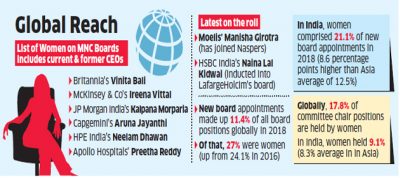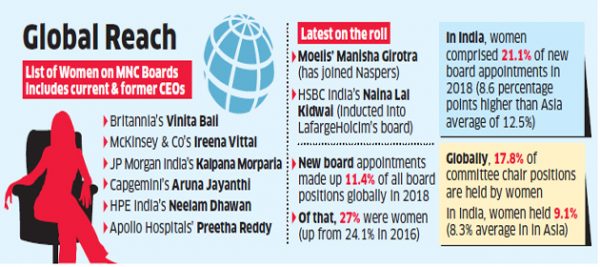Expertise in financial markets, banking, legal and technology matters works in their favor
By Rica Bhattacharyya and Sneha Shah – Economic Times
Mumbai, May 20, 2019 – Women business leaders from India are now part of multinational boardrooms, as global corporations try to gain a bigger foothold in the country, with expertise in banking, financial markets, legal and technology matters working in their favor.
The illustrious list includes current and former chief executives at big-name corporations, such as Britannia’s Vinita Bali, McKinsey & Co’s Ireena Vittal, JP Morgan India’s Kalpana Morparia, Capgemini’s Aruna Jayanthi, HPE India’s Neelam Dhawan and Apollo Hospitals’ Preetha Reddy.
And, the latest on the roll is boutique investment bank Moelis’ Manisha Girotra, who has joined Naspers. A week ago, Naina Lal Kidwai, who headed HSBC’s India operations, was also inducted into LafargeHolcim’s board.
“All these women have (made) great contribution and their selection would be entirely on merit, not just to tick the diversity box,” said Shailesh Haribhakti, chairman of audit and accounting company Haribhakti & Co., and an independent director in many Indian companies. “Additionally, they have experience of working in India, which few other geographies can beat.”
New board appointments made up 11.4 percent of all board positions globally in 2018. Of that, 27 percent were women, up from 24.1 percent in 2016, according to executive recruitment firm Egon Zehnder.
“Globally, many boards are much more inclined to demonstrate diversity than we are in India, and the norm in many countries is 30 percent representation,” said Kidwai, who joined the board of the world’s largest cement and building materials company last week. A veteran banker, Kidwai had earlier served on the global board of Nestle for 12 years since 2006.
In India, women comprised 21.1 percent of new board appointments, 8.6 percentage points higher than the average in Asia of 12.5 percent, Egon’s Global Board Diversity Tracker 2018 survey showed.
“These women bring the coveted and much-valued experience of working in a large growth market where they have learned to tackle tough and challenging business situations head-on,” said Pallavi Kathuria, managing partner for Egon Zehnder’s India offices.
Globally, 17.8 percent of committee chair positions are held by women. In India, women held 9.1 percent of committee chairs, compared to an average of 8.3 percent in Asia, the data showed. “Diversity is well acknowledged globally and there is enough buy in for women,” said Girotra, who heads Moelis India.
Naspers, the South African internet and media conglomerate, which made around $10 billion from a share sale in social media giant Tencent, sees India as a top market for capital allocation.
“India as a market is very important globally and boards feel that representation from countries such as India and China is important on boards for more understanding,” Girotra said.
Already, several women from Latin America and Africa are on global corporate boards as companies have increased business presence in these regions.
“There’s an increasing demand for gender diversity, mandated or otherwise, on boards, which provides an opportunity for qualified women, including from India to join global boards,” said Vinita Bali, former head of Britannia.
Companies are being driven by mandates to represent more women on boards. Also, there are quite a few well-qualified top executives from sectors such as banking, financial services and technology, making them vital for global companies.








